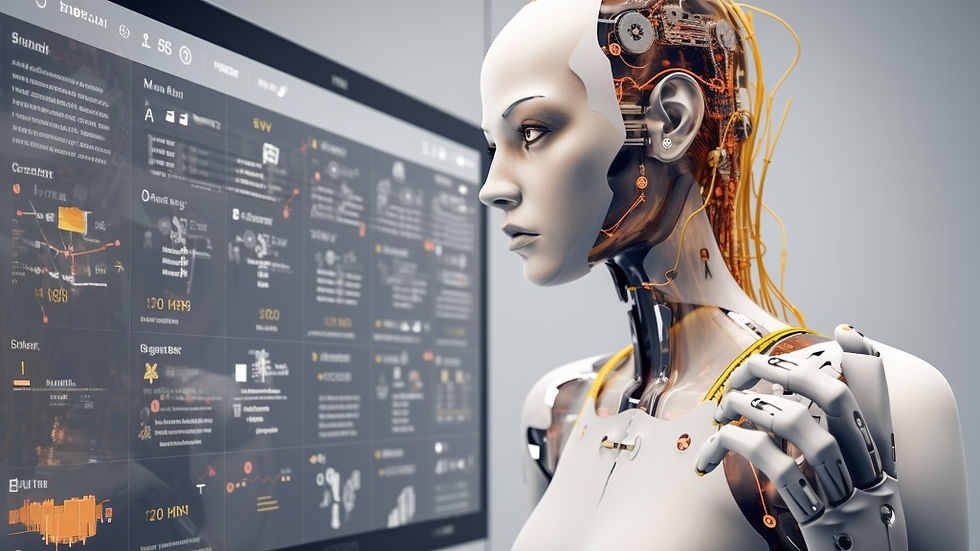How AI is Revolutionizing Marketing: A Comprehensive Look at the Future of Automation 🤖📈
- Carlos Marquez
- Oct 16, 2023
- 3 min read

Artificial Intelligence (AI) is transforming the landscape of marketing in unprecedented ways. From automating repetitive tasks to providing deep insights into consumer behavior, AI is becoming an indispensable tool in a marketer's arsenal.
This post will delve into the various facets of marketing that AI is impacting, examining current limitations and how AI is poised to change the game.
The Impact of AI on Different Areas of Marketing
Content Creation: From Manual Labor to AI-Generated Copy
Content creation is time-consuming and often requires a deep understanding of the target audience. It's challenging to produce high-quality content at scale.
How AI Will Change This: AI tools like GPT-4 can generate high-quality, SEO-friendly content that is virtually indistinguishable from human-written text. Instead of needing many content writers AI will create the content and content writers will evolve to become content editors by humanizing content.
Key Insight: AI can significantly speed up the content creation process and allow for more personalized marketing strategies.
Example: Platforms like Copy.ai and Writesonic are already using AI to generate blog posts, social media updates, and SEO-friendly articles, freeing human resources for more strategic tasks.
Web Design: From Static to Dynamic User Experiences
Traditional web design often relies on static templates that don't adapt to individual user behavior, potentially leading to lower engagement and conversion rates.
How AI Will Change This: AI algorithms can analyze user behavior in real-time to create dynamic and personalized web experiences. AI can identify the flaws in one user experience and advise concrete changes in visuals and copy.
Key Insight: AI can lead to higher engagement and more effective conversion strategies by personalizing the user experience.
Example: Wix ADI and Zoho PageSense use AI to optimize website layouts, calls-to-action, and even color schemes based on real-time user data.
Chatbots in Customer Service: From Limited Availability to 24/7 Support
Human-operated customer service is often limited by time zones and manpower, leading to delays and less-than-ideal user experiences.
How AI Will Change This: AI-powered chatbots can provide 24/7 customer service, handling everything from answering FAQs to guiding users through complex processes. It has been proven in several studies that customers want immediate answer, independent if it is created by a human or one AI bot.
Key Insight: AI chatbots can significantly enhance the user experience by providing real-time, round-the-clock support.
Example: Companies like Sephora and H&M are already using chatbots to assist customers in real-time, significantly enhancing the shopping experience.
Data Analysis: From Surface-Level Insights to Predictive Analytics
Traditional data analysis tools can provide surface-level insights but often lack the capability to predict future trends or consumer behavior.
How AI Will Change This: AI can analyze vast sets of data to identify trends, make predictions, and provide actionable insights that can significantly impact marketing strategies. This will allow top management of companies to talk directly to their data, without the need of several specialists in the room. Just data and AI.
Key Insight: AI's predictive analytics can help businesses focus their marketing efforts more effectively.
Example: Google Analytics' AI capabilities are already being used to predict customer behavior, allowing businesses to target high-value prospects.
Email Marketing: From Generic Campaigns to Personalization at Scale
Traditional email marketing often involves sending generic messages to large lists, leading to lower engagement and conversion rates.
How AI Will Change This: AI algorithms can analyze user behavior and engagement to create highly personalized email campaigns. AI supports experience managers to create unique experiences, identify the right discount at the right time and provide one unique customer experience.
Key Insight: AI can significantly improve engagement and conversion rates by personalizing email content.
Example: Mailchimp uses AI to segment email lists and personalize content, leading to higher open rates and conversions.
FAQ
Q: Is AI replacing human roles in marketing?
A: While AI can handle repetitive tasks, the creative and strategic aspects of marketing still require human intelligence.
Q: How reliable is AI in making marketing decisions?
A: AI provides data-driven insights that are highly reliable, but they should be used in conjunction with human expertise for the best results.
Q: What are the ethical considerations in using AI for marketing?
A: Issues like data privacy and algorithmic bias are important ethical considerations when implementing AI in marketing strategies.
Conclusion
AI is not just an auxiliary tool but a transformative force in marketing. It's enabling businesses to engage with their customers in more meaningful ways, offering personalized experiences and insights that were previously impossible or highly resource-intensive to achieve.
Would you consider integrating AI into your marketing strategy? Your insights could add another layer to this fascinating topic.
The integration of AI in marketing is not just a trend but a paradigm shift. By automating repetitive tasks and providing deep, actionable insights, AI allows marketers to focus on what they do best: being creative and strategic. Are you ready for the AI revolution in marketing?
Want to explore how to use AI for Marketing, book a 1-2-1 consultancy call here.






Comments